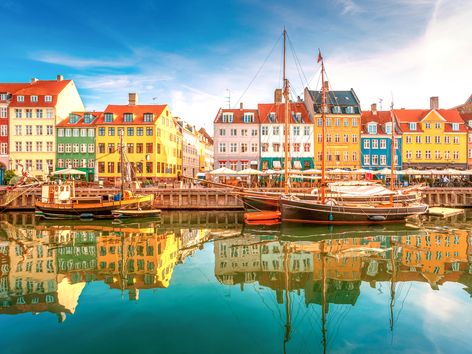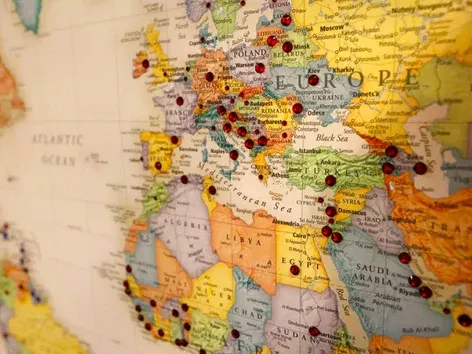How to Find Cheap Accommodation in Europe: useful tips

Planning a trip to Europe but on a tight budget? No problem! You can find many budget accommodation options for your trip. Find out more about the best places to find budget accommodation in Europe
Although Europe is not the most budget-friendly destination, it offers a whole lot of cheap accommodation options. So, if you're looking for budget places to stay when travelling to Europe, make sure you read this article! According to statistics, the most popular tourist countries in Europe are France, Italy and Spain.
If you're planning a trip to Europe, be sure to take advantage of a health insurance policy, as it guarantees high-quality medical care anywhere in the world and can protect you from unnecessary expenses while travelling. You can buy insurance from trusted agents on the Visit World portal. Follow the link, choose your nationality and country of destination, and look for a policy that meets your specific requirements.
Budget alternatives to hotels in Europe
Who says that expensive hotels with luxury services and amenities are the only type of accommodation you need to enjoy a great trip to Europe?
We offer you a number of interesting accommodation options that won't break your budget. In some cases, these alternatives to hotels can be even more interesting than the trip itself:
1. Hostels. If you're young and adventurous and don't mind sharing a room with complete strangers, hostels are a great option for you;
2. Home exchange. For many budget-conscious holidaymakers, staying in someone else's family home is a great way to save money. Home sharing is beneficial because it is almost free and allows you to immerse yourself in the real living environment of locals and enjoy an authentic travel experience;
3. Capsule hotels. These cosy, small, compact hotels focus on basic needs such as sleeping and showering. They are a great option for an overnight trip;
4. Airbnb. This is a popular platform for renting out your home to travellers. Here, you can find the most affordable positions;
5. Camping. If you are travelling on a budget, camping is one of the cheapest alternatives to hotels. If you are comfortable sleeping outdoors, camping can provide you with a unique travel experience;
6. Organic farms (WWOOF). WWOOF is a global movement that connects travellers with organic farmers and promotes cultural interaction and exchange. If the idea of helping on a farm appeals to you, you can exchange your skills for food and shelter;
7. B&B. Bed and Breakfasts are a great alternative to traditional hotels that you can consider if you want to save money on accommodation or simply because you are not attracted to faceless hotel rooms;
8. Couch-surfing. This popular site will help you meet locals and get access to free accommodation in their home. If the host agrees to let you stay in their home, they will provide you with their sofa, guest room or air mattress.
9. Glamping. If you're not up for hardcore wild camping, you might consider glamping, a more luxurious way of staying where nature meets modern conveniences.
Finding affordable accommodation in Europe
Now that you know the wide range of accommodation options available, you may think that each of them is suitable as proof of residence for your Schengen visa application.
In most cases, you can use all of the above types of accommodation as proof of residence for your Schengen visa application, as long as you can provide documents to prove your residence.
According to the Schengen Visa Code (Article 14), "when applying for a single visa, the applicant must provide proof of residence or evidence of sufficient funds to cover the costs of living".
Nevertheless, we do not recommend you to submit camping reservations as proof of residence when applying for a Schengen visa.
The reason for this is that visa officers need to make sure that you have enough funds to cover your accommodation costs during your trip. Therefore, providing a campsite reservation as proof of accommodation may raise some doubts about your ability to cover your expenses when travelling to Europe.
If you decide to stay in someone else's home during your trip (home exchange, aid exchange, WWOOF, couch-surfing, friend's house, etc.), make sure that you submit a letter from the sponsor of your accommodation for your Schengen visa. The letter should state that the person living in the Schengen area is providing you with accommodation only for the duration of your trip.
If the person providing you with accommodation also covers other expenses (e.g. meals), you should submit a letter of general sponsorship to the embassy or consulate.
In addition, make sure that you do not book a hotel without 100% prepayment, as if your visa is refused, the hotel may not refund your money and you risk losing the money you spent on accommodation.
With this in mind, let's take a look at some useful tips on how to search for and find cheap accommodation in Europe.
6 ways to find cheap accommodation in Europe
If you're travelling to Europe on a budget, the following tips will help you keep more money in your pocket and enjoy more tourist attractions and activities:
1. Choose your location carefully
When you're looking for cheap accommodation, you might be tempted to find a hotel a few kilometres outside the city (as it's usually cheaper than in the centre). But are you sure you want to pay extra for transport costs? How much would you pay to get there from the airport?
Is the hotel close to a train or bus station so you don't have to pay for a taxi every day to get to the main attractions?
We recommend that you look through your accommodation options and choose not only by price, but also by location. This will help you save a lot of time and money!
2. Use the best hotel booking sites to compare prices
Whether you're looking for a hotel, hostel or B&B, you need to use the best booking sites to find the best deals.
Apart from Booking.com, which we consider to be one of the best European travel sites, there are other great search engines and online travel agencies (OTAs) that can help you find the accommodation that best suits your needs:
Pricing: A user-friendly search engine. If you're looking to save money, Priceline offers a unique "Name Your Price" option where you can specify the final price you're willing to pay;
Hotels.com: A leading hotel provider that offers a wide range of filters that you can use to narrow down your choices;
Hotels Combined: An amazing metasearch engine that shows availability and prices on all the leading hotel booking sites in the world;
Tripadvisor: One of the best online travel companies. Tripadvisor has a unique feature that allows you to simultaneously view hotel reviews and compare prices to find the best deals;
Trivago: Another great hotel booking site that includes some lesser-known hotel sites that you may not be able to find elsewhere;
3. Split the cost of the apartment
If you're travelling with family or a group of friends, this is one of the best ways to save on accommodation.
Apartments and rented houses like those on Airbnb are usually much cheaper than individual hotel rooms.
In addition, such places are usually more flexible in terms of check-in and check-out times and allow you to actively engage in the local lifestyle rather than staying in a modern and impersonal hotel room.
4. Follow social media and sign up for notifications on booking sites
Many sites post great deals on accommodation through their social media channels, so make sure you follow their pages to keep up to date with the latest offers.
Some websites (such as Hotels.com) allow you to track the prices of your favourite hotels and get alerts whenever prices change.
Monitoring hotel price fluctuations is a great way to save money on accommodation if you start looking for accommodation in Europe in advance and are not in a hurry to check in right away.
5. Book a secret hotel
Many websites (for example, lastminute.com or Hotwire) offer great deals from hotels that want to protect their identity by offering additional discounts on unsold rooms.
These "mystery hotels" can save you up to 70% on your stay, so if you're looking to save some extra cash, it's worth trying your luck with one of these secret hotels.
Although you can usually see the price and services provided, note that the name of the hotel will remain hidden until you book the room.
6. Consider how free amenities can save you money
The free amenities included in your hotel room can help you save more money than you think.
If you find a place that provides free services such as parking, Wi-Fi, or breakfast, it can help you save a significant amount of money - as long as the room rate isn't raised to cover these services.
Additionally, appliances such as a coffee maker, fridge, microwave or electric kettle can help you store food and make your own tea and coffee, which can save you money on eating out.
Daria Rogova, Head of Insurance at Visit World
To move, travel or work safely in a new country, you will need travel insurance. You can apply for an extended policy on our website here.
Products from Visit World for a comfortable trip:
Travel guide for 200 countries;
Legal advice from a local specialist on visa and migration issues;
Travel insurance around the world (please select the country of interest and citizenship to receive services);
Medical insurance all over the world.
More articles on the topic:
Moving to the EU: rules for obtaining a residence permit in France, Germany, Italy, the Netherlands and Spain
The most affordable places to buy real estate abroad in 2024
The most affordable tourist destinations: where to go on holiday in 2024
Flight cancellations in Finland: February strike by airport workers
Romania and Bulgaria will enter the Schengen zone: what changes for travellers?
France is recognised as the most popular tourist destination in 2024
The safest countries in Latin America: a detailed overview
5 travel myths that will stop you from long-term travel
Recommended articles
2 min
Travels
The safest and most dangerous cities in Europe: a new EU ranking
A new ranking of the safest and most dangerous cities in Europe provides an opportunity to better understand the crime and security situation in different cities of the European Union. The assessment is based on various factors such as crime, corruption, quality of life, law enforcement and security systems. Read more about the safest and most dangerous cities in Europe
02 Feb. 2024
More details2 min
Popular
The World's Safest Countries and Cities for Travel
Berkshire Hathaway Travel Protection has released its annual State of Travel Insurance - Safest Destinations report, which identifies the safest countries and cities. Find out more about the safest cities in the world
16 Feb. 2024
More details2 min
Popular
The worst cities in Europe for migrants: a new report by the European Commission
The European Commission has created a new report that identifies the 10 worst European cities for immigration. Find out more about which cities are recognised as the most unfavourable for expats
17 Feb. 2024
More details2 min
Popular
The most dangerous countries in Europe: ranking in 2024
Europe is considered one of the most developed regions in the world, but that doesn't mean there are no dangerous countries in Europe. Learn more about the Global Peace Index (GPI) and the 10 most dangerous countries in Europe in 2024
19 Feb. 2024
More detailsAll materials and articles are owned by VisitWorld.Today and are protected by international intellectual property regulations. When using materials, approval from VisitWorld.Today is required.
